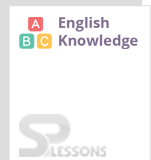 Introduction
Introduction
An Adverb is a word that tells us more about a verb, an adjective or even another adverb. An adverb modifies a verb. Examples: slowly, entirely. Adverbs Practice Quiz 1 facilitates learning about the usage of Adverbs in the English Language. Most adverbs often end in -ly.
Examples:
1. I will write later. [ The adverb later modifies the verb write.]
2. The house was strangely quiet. [ The adverb strangely modifies the adjective quiet.]
3. He is almost always busy. [ The adverb almost modifies the adverb always.]
Adverbs provide context. More specifically, adverbs are words that provide a description of how, where, when, how much and to what extent or with what frequency something is done or something happens. Examples: Quietly, already, extremely, rarely.
Adverbs are broadly classified into the following:
-
1. Simple Adverbs
2. Interrogative Adverbs
3. Relative Adverbs
 Quiz
Quiz
Directions (1Q - 5Q): Read each sentence given below and find out whether there is an error in it. The error, if any will be one of the parts of the sentence which are marked as A, B, C and D. If there is no error, the answer will be (E) i.e. No error. (Ignore the errors of punctuation, if any).
Q1. I cannot ask (A) / my father (B) / for his car without (C) / any vividly reason. (D) / No Error (E)
- A. A
B. B
C. C
D. D
E. E
- A. A
B. B
C. C
D. D
E. E
- A. A
B. B
C. C
D. D
E. E
- A. A
B. B
C. C
D. D
E. E
- A. A
B. B
C. C
D. D
E. E
Directions (1Q - 5Q): Read each sentence given below and find out whether there is an error in it. The error, if any will be one of the parts of the sentence which are marked as A, B, C and D. If there is no error, the answer will be (E) i.e. No error. (Ignore the errors of punctuation, if any).
Q1. He said (A) / it was (B) / quite all right (C) / to reject the offer. (D) / No Error (E)
- A. A
B. B
C. C
D. D
E. E
- A. A
B. B
C. C
D. D
E. E
- A. A
B. B
C. C
D. D
E. E
- A. A
B. B
C. C
D. D
E. E
- A. A
B. B
C. C
D. D
E. E
Directions (1Q - 5Q): Read each sentence given below and find out whether there is an error in it. The error, if any will be one of the parts of the sentence which are marked as A, B, C. If there is no error, the answer will be (D) i.e. No error. (Ignore the errors of punctuation, if any).
Q1. My mother works (A) / very quicker than (B) / I at embroidery (C) / No error (D)
- A. A
B. B
C. C
D. D
E. E
- A. A
B. B
C. C
D. D
E. E
- A. A
B. B
C. C
D. D
E. E
- A. A
B. B
C. C
D. D
E. E
- A. A
B. B
C. C
D. D
E. E
Other Articles
 Study Guide
Study Guide
 Exams
Exams
| Competitive Exams - College Entrance Exams | ||
|---|---|---|
| Category | Notification | |
| Diploma | NITC New Delhi | Goa Diploma Admissions 2019 |
PG |
GATE 2020 |
ATMA 2019 |
| Click Here For – All India Entrance Exam Notifications | ||
 Daily CA
Daily CA
 Job-Alerts
Job-Alerts
 SP Quiz
SP Quiz
| Competitive Exams - Practice Sets | |
|---|---|
| Category | Quiz |
| Quant Aptitude | Probability |
| Insurance Awareness | Insurance Awareness |
| Reasoning Ability | Direction Sense |
 GK
GK
| General Knowledge for Competitive Examinations | |
|---|---|
| Topic | Name of the Article |
| GK - World | Nobel Prize Winners List |
| Countries Capital Currency | |
| GK - India | Famous Books and Authors |
| Indian Rivers | |
| GK - Abbreviations | Finance Abbreviations |
| Computer Abbreviations | |
| GK - Banking & Insurance | Deposit Insurance – Credit Guarantee Corporation |
| Public Finance and Budget | |
| GK - Science & Technology | Zoology Terminology |
| Important Scientific Instruments | |
| IBM IIT Bombay AI Research | |





